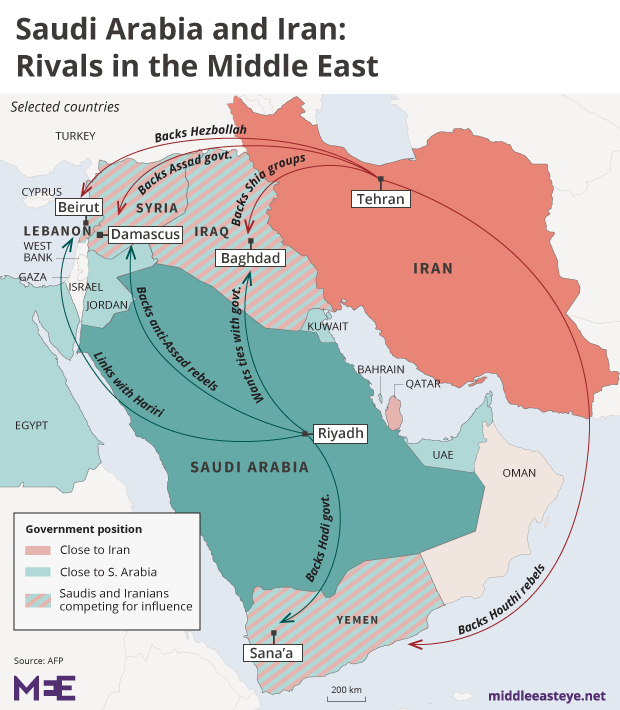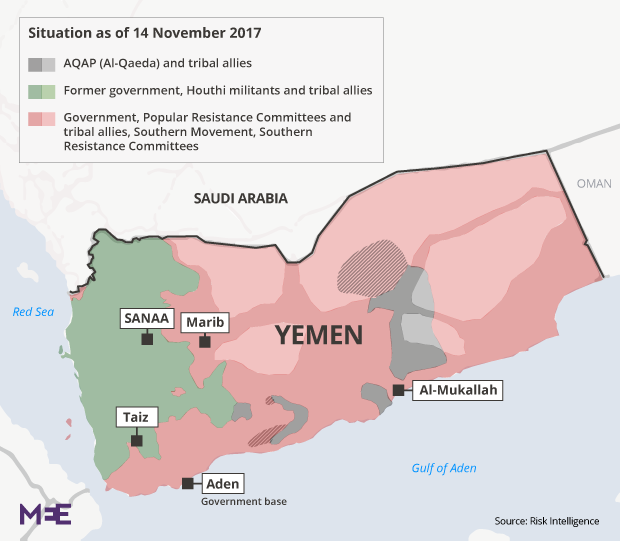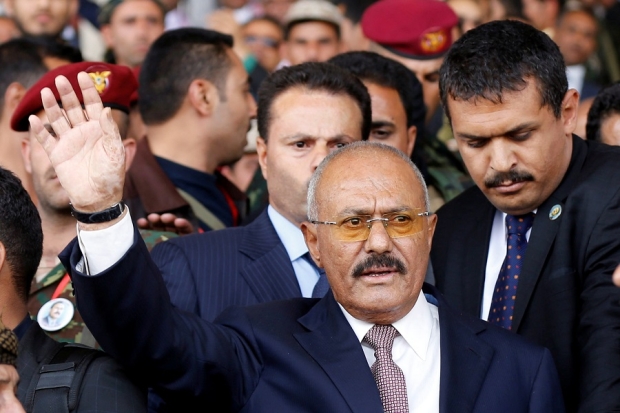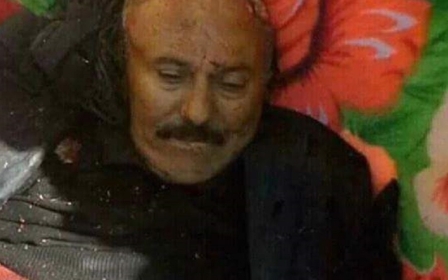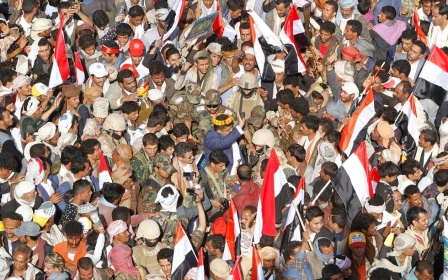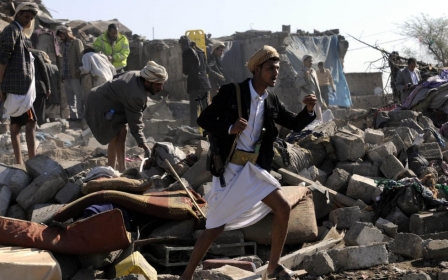Saleh’s killing throws Iran’s Yemen strategy into disarray
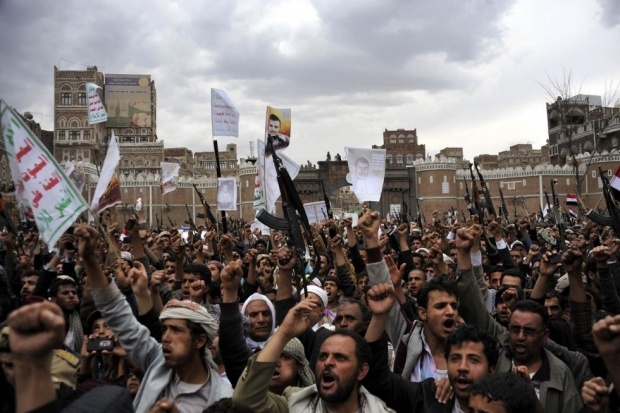
The surprise decision of Yemen's slain former leader, Ali Abdullah Saleh, to reach out to Saudi Arabia, was widely interpreted as heralding a major shift in the Yemen conflict.
Saleh's reported death comes on the heels of intensifying clashes in the capital Sanaa between the Ansar Allah movement (popularly known as the "Houthis") and forces loyal to Yemen's former strongman. The fierce in-fighting in Sanaa – coupled with a stepped up Saudi air campaign against ostensibly Houthi targets in the city – helped to precipitate a complete breakdown in the Houthi-Saleh alliance.
The Saleh connection
Saleh's reported death – allegedly as a result of fighting with Houthi militias – renders the end of the alliance all but inevitable. Whilst this development does not necessarily translate to a Saudi victory, at minimum it deals a major blow to Iran's effort at defeating Saudi goals in Yemen.
In fact, the growing isolation of the Houthis, with social media accounts showing popular anger against their rule, throws Iran's entire Yemen strategy into question. Absent a viable political alternative to the one proposed by the Saudi-led coalition, Iran does not have a sustainable Yemeni strategy.
In the light of Saleh's ill-fated alliance with the Houthis, his difficult relationship with Iran has all but been forgotten. It is worth remembering that the slain Yemeni leader was a bête noire of the Islamic Republic for more than two decades.
Absent Saleh's military and political support, it is unlikely that the Ansar Allah movement would have been able to successfully withstand the Saudi-led assault for so long
Saleh was a strong ally of Baathist Iraq and lent Saddam Hussein significant rhetorical and practical support during the Iran-Iraq war. Indeed, Yemenis acting in both ideological and mercenary capacities, fought against Iranian troops throughout the war.
Following the war's end, Saleh's continuing support for Iraq's strategic ambitions, notably his highly controversial decision to support the Iraqi invasion of Kuwait in 1990, was a source of concern for Tehran.
More recently, Saleh's decision to crack down on the Houthis in 2004, thus sparking a series of Houthi-led insurgencies in the northern Saada province, was treated as a challenge by Iran in so far as it weakened a potential ally.
Saleh's military and political support
Whilst the origins of Iran's partnership with the Houthis is not entirely clear, it is more than likely contacts were made early in the 1990s, when the Houthis first emerged as a social and cultural force in Yemen's northern extremity. From Iran's perspective, the Houthi's geographical proximity to Saudi Arabia made them hard to ignore.
Ironically Saleh prosecuted the successive wars against the Houthis in part on the same premise as the one adopted by the Saudi-led coalition, namely that the Ansar Allah movement represents a "proto-Hezbollah" and thus an extension of Iran.
It was against this backdrop that Iran supported the 2011 Yemeni uprising, in addition to a strongly held perception in Tehran that Saleh was supported by Saudi Arabia as part of a broader strategy to contain the influence of the so-called Arab Spring on the Arabian Peninsula.
Propaganda aside, the degree of IRGC involvement in the Yemeni conflict is not clear
Saleh's decision to quietly support the Houthi takeover of Sanaa in September 2014 (by allegedly influencing the Yemeni army not to resist the Houthi operation) was in keeping with Iranian plans to create a wider political cover for the Houthi advance.
The utility of the former president was further underlined once the Saudi-led military coalition launched a bombing campaign in March 2015. Absent Saleh's military and political support, it is unlikely that the Ansar Allah movement would have been able to successfully withstand the Saudi-led assault for so long. The immediate question at this juncture is whether Saleh's demise will precipitate a Houthi collapse.
An incomplete strategy
Although deeply suspicious of Saleh, the Iranians had invested significant diplomatic and political capital in the alliance between the Ansar Allah movement and elements of the Yemeni military and security forces.
This investment was underscored by Iran's official reaction to the outbreak of fighting between the Houthis and Saleh loyalists, with Iranian Foreign Ministry spokesman Bahram Ghassemi urging a "united national front" against external aggression.
This official Iranian reaction, although hardly surprising, nonetheless speaks to a degree of policy dissonance in Tehran.
Saleh's departure threatens to further radicalise the conflict. This is bad news for everybody
Whilst the foreign ministry, and the broader diplomatic policy-making community in Tehran, is keen to embed Iran's support for the Houthis in a broader Yemeni alliance, the powerful Islamic Revolutionary Guards Corps (IRGC) may be pulling in a different direction by further isolating and radicalising the Houthis.
Propaganda aside, the degree of IRGC involvement in the Yemeni conflict is not clear. Hitherto, there has been no strong indication of a deployment by the Quds force (the IRGC’s expeditionary wing) in Yemen.
And whilst the IRGC commander, Major-General Mohammad Ali Jafari, recently admitted to an “advisory” role in Yemen, he did not specify as to whether this was provided on the ground or from a distance.
Regional proxy wars
This lack of clarity can exacerbate the policy dissonance in Tehran, especially if the IRGC decides to escalate its support for the Houthis by supplying them with more advanced weapons systems. There is evidence this may have already happened, with a United Nations body reporting that remnants of four ballistic missiles fired at Saudi Arabia appear to have been Iranian in origin.
For their part, key spokesmen of the Iranian national security establishment, including the head of the national security and foreign policy committee of the Majlis (parliament), Mohammad Javad Jamali Nobandegani, strenuously deny allegations centred on the supply of ballistic missile technology to the Houthis.
Beyond policy dissonance, there are wider problems with the Iranian strategy in Yemen. Typically, in regional proxy wars Iran tries to reach out to all key stakeholders in the conflict, even to its most committed adversaries. This approach came into sharp relief in the Syrian conflict, as Iran negotiated with its most bitter foes for tactical advantage.
The problem in Yemen is that Iran has little to no meaningful contact with the forces ranged against the Houthis, including the fledgling government of Abd Rabbuh Mansour Hadi, the key tribes and the various elements of the Yemeni branch of the Muslim Brotherhood.
Saleh's departure exacerbates this strategic deficit and threatens to further radicalise the conflict. This is bad news for everybody.
- Mahan Abedin is an analyst of Iranian politics. He is the director of the research group Dysart Consulting.
The views expressed in this article belong to the author and do not necessarily reflect the editorial policy of Middle East Eye.
Photo: Yemeni supporters of the Houthi movement attend a demonstration against Saudi military operations in Sanaa's Bab Al Yemen, Yemen on 26 March 2015.
This article is available in French on Middle East Eye French edition.
New MEE newsletter: Jerusalem Dispatch
Sign up to get the latest insights and analysis on Israel-Palestine, alongside Turkey Unpacked and other MEE newsletters
Middle East Eye delivers independent and unrivalled coverage and analysis of the Middle East, North Africa and beyond. To learn more about republishing this content and the associated fees, please fill out this form. More about MEE can be found here.



